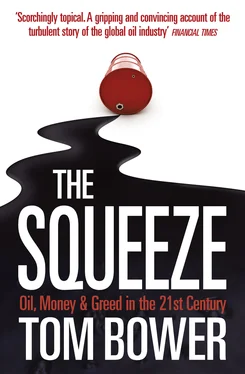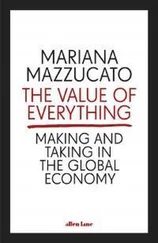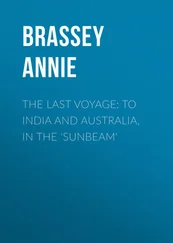Fortunately, the risk of Putin blocking Exxon’s deal with Khodorkovsky had, in Raymond’s opinion, been lifted three months earlier when the president had visited London to witness Mikhail Fridman, another oil oligarch, sign an agreement with John Browne, BP’s chief executive, to sell 50 per cent of TNK, Russia’s third largest oil company, for just $10 billion. Raymond did not underestimate the importance of that deal, which was the largest ever foreign investment in Russia. It confirmed Putin’s favourable predisposition towards BP and, irritatingly, Browne’s decisive influence over the industry. Since 1998 Browne had not only transformed BP from an also-ran into a major challenger to Exxon, but by acquiring American oil companies he had set the pace. Raymond’s ambitions were frequently compared to Browne’s achievements.
‘He’s a bandit,’ Raymond had said in testament to the diminutive Browne’s tough negotiating skills in Alaska, where Exxon and BP shared pipelines and other facilities. Raymond disliked the Englishman’s aggressive takeovers, belligerence and business model. Although both had earned their reputations cutting costs, he dismissed Browne as a generalist and a non-engineer. ‘We don’t have hero leaders like BP,’ Raymond’s associates would observe. ‘BP,’ Raymond would say, ‘will have its moment of truth.’ Some suspected that Raymond’s unease sprang from his disapproval of Browne’s homosexuality. While tolerated within Exxon, homosexuals were barred from claiming partnership benefits for expatriate expenses and services, and overt displays of their sexual preference were discouraged. Raymond refused to addsexual orientation to Exxon’s non-discrimination agenda. Others believed Raymond was irritated by Browne’s transformation of BP from a withered wreck to challenge Exxon’s rank as number one. After two groundbreaking takeovers, a successful rebranding of BP as an environmentally friendly corporation, and big oil strikes in the Gulf of Mexico, there were rumours about Browne seeking a merger between BP and Shell to claim Exxon’s crown as the world’s largest oil producer. Closing the Yukos deal would terminate that menace.
‘If BP can do it, anyone can do it,’ was the attitude among the Exxon executives waiting for Putin in New York. ‘BP’s deal is borderline, and Exxon can do better.’ Mikhail Fridman, a tough operator, had offered TNK around the industry before BP bit, but Yukos was more enticing. The irritant was Browne’s success. Like Exxon, in the aftermath of the TNK purchase all BP’s smaller rivals, including Total, ConocoPhillips and Chevron, felt compelled to find a similar deal in Russia.
In common with all the oligarchs, Khodorkovsky had obtained his original fortune illicitly. Smart, intelligent and arrogant, he was not flashy. Despite his wealth, estimated by Forbes to be $8 billion, the 40-year-old owned no yachts, was driven in a standard S-class Mercedes and a small BMW, employed just one bodyguard, owned only one house in Zhukovka, the billionaires’ enclave outside Moscow with its own clubs and restaurants, and was entranced by the latest electronic gadgets and toys. He was never seen flaunting a mistress, owned only one private jet, and, like all Russia’s billionaires accustomed to the wreckage caused by vodka, he rarely drank. His ambitions nevertheless were serious. Since buying Yukos for $350 million in 1995 he had, with the help of Joe Mach, an abrasive and brilliant American oil engineer hired from Schlumberger, the world’s biggest provider of services to the oil industry, transformed the company’s fields by re-educating the Russian engineers. Previously large amounts of oil had been stolen by the oilfields’ managers and organised criminals, and no one cared about water contaminating the wells. The oligarchs, many suspected, merely wanted to strip the assets and carelessly allow oil production to decline. Khodorkovsky had transformed Yukos into Russia’s best oil company. Valued at $1 billion in 1999, it was worth $40 billion by 2003, and he retained a 44 per cent stake. Overseeing 100,000 employees from his gleaming headquarters, Khodorkovsky would quietly listen to advice, never yell, and never waste time with stupid ideas. Driven by ambition, he had stopped his public relations managers propagating the message of beating Lee Raymond and turning Yukos into Exxon, instead promoting the idea of selling stakes in Yukos as a stepping stone to political power in Russia.
Khodorkovsky’s ambition to topple Vladimir Putin was undisguised. During his conversations with Raymond in Moscow in early 2003, he anticipated his supporters winning 40 per cent of the seats in the Duma, the Russian parliament, and himself becoming prime minister after the elections in December that year. By June 2003 he was assumed to have bribed sufficient members of the Duma, including some of Putin’s supporters, to defeat the government’s legislation on tax reform. If the legislation became law, Khodorkovsky was heard to predict, Putin would ‘get fired’. Putin’s irritation had not troubled Khodorkovsky, and relations between the two had deteriorated as the oligarch flaunted his ability to bribe members of the Duma in the months before the elections. Russia’s internal strife did not concern Exxon’s chairman, although he knew that the Kremlin was the only obstacle to a deal. ‘I’ll look after the government,’ Khodorkovsky had reassured Raymond. ‘Don’t rely on that,’ Raymond was advised. ‘We need our own approach.’ Other than Putin himself, only three other people could decide Yukos’s fate, and those power-brokers, everyone assumed, were not sure themselves what would happen next. Igor Sechin was among those who could provide reassurance.
Igor Sechin was Putin’s trusted ‘Mr Oil’ in the Kremlin, the gatekeeper to Russia’s oil policy. The two had become friends while working together for the mayor of St Petersburg, Anatoly Sobchak, during the Yeltsin era. Sechin was also chairman of Rosneft, a state-owned oil company. A key member of the ‘ siloviki ’, the St Petersburg crowd of hard-faced former KGB and military officers surrounding Putin in the Kremlin, 43-year-old Sechin was regarded by outsiders as disdainful of the Jewish oligarchs who controlled about 50 per cent of Russia’s economy. Convinced that Sechin would oppose a deal between Yukos and Exxon, Exxon’s representatives in Moscow had sought an alternative route through the Kremlin’s hierarchy to secure Putin’s approval. Igor Shuvalov, Putin’s economic adviser, was chosen as the conduit. Based at Old Square, the former Communist Party headquarters linked to the Kremlin by an 800-yard tunnel, Shuvalov had heard about Exxon’s ‘equity investment’ in Yukos soon after Khodorkovsky initially approached Tillerson. Since the size of Exxon’s proposed stake was deliberately concealed, he had no reason to object. ‘I will inform the boss and get back to you,’ he had said. One week later, Shuvalov telephoned Exxon’s office: ‘This is interesting. We are supportive.’
Since then, greed had infected the negotiations. As Exxon’s experts grasped Yukos’s true value, caution was abandoned. A desire for a 20 per cent stake was replaced by wanting everything. ‘We hunt for whales, not sardines,’ said Raymond. ‘We won’t be a junior partner in Russia. We’ll only invest in Russia when the terms are right.’ Khodorkovsky also became greedy. Aware that the oil majors needed new reserves and were envious of BP’s deal, he wanted top dollar for his shares. The timing, he said, was perfect. The rouble had devalued, and Yukos was aggressively valued. At $35 a barrel, oil prices, he believed, were peaking. Like every oil executive, he could not imagine where oil prices were heading over the following five years.
In June 2003, Khodorkovsky anticipated success. To celebrate Yukos’s record profits, he rented a luxury yacht to sail from Moscow to St Petersburg. Four days later, his business partner Platon Lebedev was arrested and charged with fraud. ‘Don’t worry,’ Khodorkovsky told his entourage. ‘He’ll be in jail for three months and then we’ll get him out.’ No one was quite sure whether Khodorkovsky genuinely believed his own bravado, but he refused to flee Russia. ‘I’m not going to become the next insane Berezovsky,’ he said, referring to the oligarch who, after helping Putin to power, fled as a permanent exile to London. In the event Lebedev was found guilty of tax evasion and sentenced to eight years’ imprisonment.
Читать дальше











![John Bruce - The Lettsomian Lectures on Diseases and Disorders of the Heart and Arteries in Middle and Advanced Life [1900-1901]](/books/749387/john-bruce-the-lettsomian-lectures-on-diseases-and-disorders-of-the-heart-and-arteries-in-middle-and-advanced-life-1900-1901-thumb.webp)
